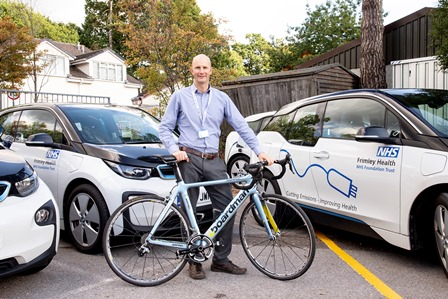22 November 2019
 The threat to our daily lives from climate change and the need to become more sustainable has never before had such a high profile.
The threat to our daily lives from climate change and the need to become more sustainable has never before had such a high profile.
Programmes such as Blue Planet have illustrated the need for action across all sectors and the NHS is no exception.
The NHS’s footprint is about 5.4% of the whole of the UK’s carbon footprint and every NHS organisation has a responsibility to take action to reduce it.
Everything we do at Frimley Health that relates to providing a service, whether it’s through our activities or purchasing, contributes to our carbon footprint. This equates to c. 144,000 tonnes of carbon each year.
The Trust’s sustainable development management plan commits us to reducing our carbon emissions by 80% by 2050 in line with the Climate Change Act 2008.
Head of sustainability Richard Hilson said: “We all have a responsibility to take action and part of the work we do is to encourage staff to think about how they can reduce their carbon emissions in their areas of work. So we are developing training and tools to help people make a change.
“We have also installed over 1,500 LED lights across the Trust with plans to convert a further 4,000 light fittings over the next two years at which point over 80% of the Trust will have LED lighting.
“And we installed a new £5m combined heat and power (CHP) centre at Wexham which will cut annual CO2 emissions by 1,323 tonnes as well as bringing energy savings of £600,000 a year.
“But I’m just as excited about the other areas that are really important for us, such as transport and recycling initiatives, and getting colleagues to think about the environmental, social and economic impact of their actions.”
Working with the Centre for Sustainable Healthcare, Richard and his team have introduced Green Wards workshops with six teams across Frimley Health. The aim is to empower clinicians to try and bring about sustainable change in their day to day practice.
Each team has selected a project to test over three months and feed back their conclusions. A member of the Frimley Health and Care ICS, Harriet Luximon, will also support teams during the process.
Richard added: “The impact of this could be just as significant in carbon reduction terms as the bigger projects that are resource heavy. The changes they identify could potentially be scaled up across the Trust because of common themes or inefficiencies that might emerge.”
Car journeys to and from the Trust and between sites greatly impacts on our carbon footprint with patient and visitor travel making up a third of our local activity (non-supply chain) emissions. This is a shared challenge to address with our ICS partners.
Since the introduction of nine electric staff pool cars across the Trust, CO2 emissions per mile through staff travel have reduced and had a positive impact on local air quality.
Car sharing and cycle schemes for staff also reduce our carbon footprint.
Recycling schemes at the Trust are also helping to reduce emissions. An initial pilot of Warp It, a reuse portal for public and third sector organisations resulted in a saving of approximately 35 tonnes of CO2 and £37,000 in just six months. It has since been rolled out across the Trust.
And there are Trust-wide recycling schemes in place for certain medical and surgical devices such as oxygen masks and tubing.
Richard, pictured above, is passionate about sustainability and tries to lead by example. He cycles to and from work, often a 20-mile round trip, and three years ago decided to manage without a car.
He explained: “I hire one occasionally when I need to. Cost-wise it’s probably about the same but there is a positive environmental impact and it’s definitely healthier. I know it sounds hard to do but it’s all about changing habits.”

